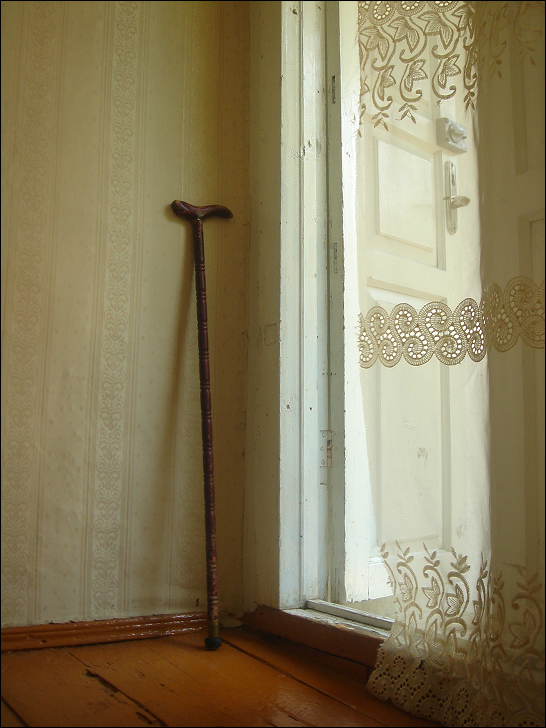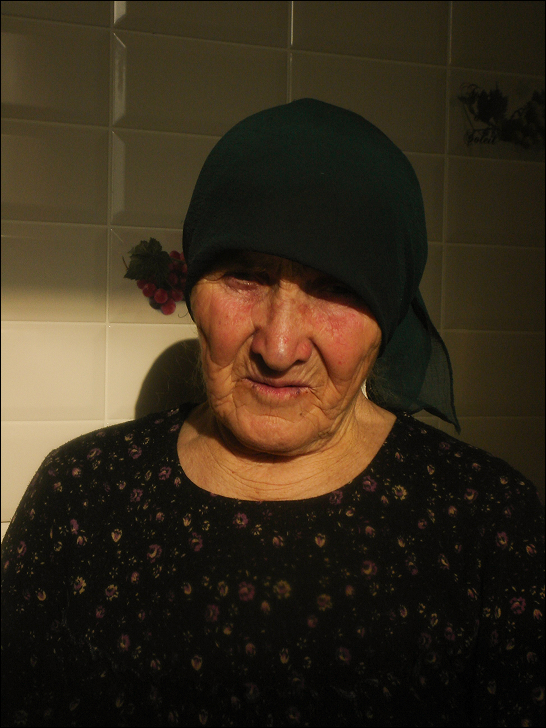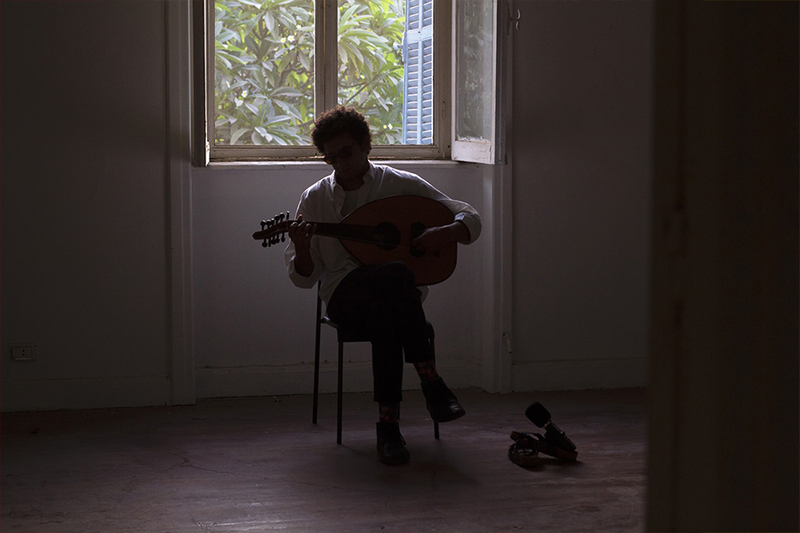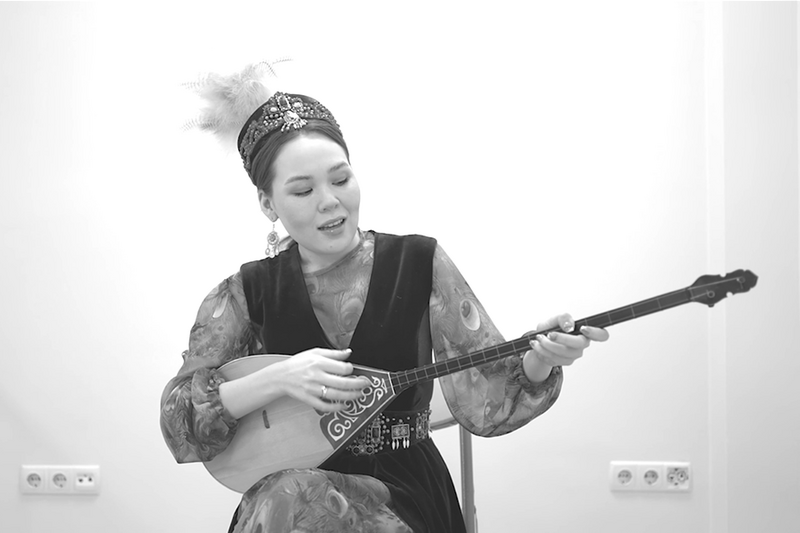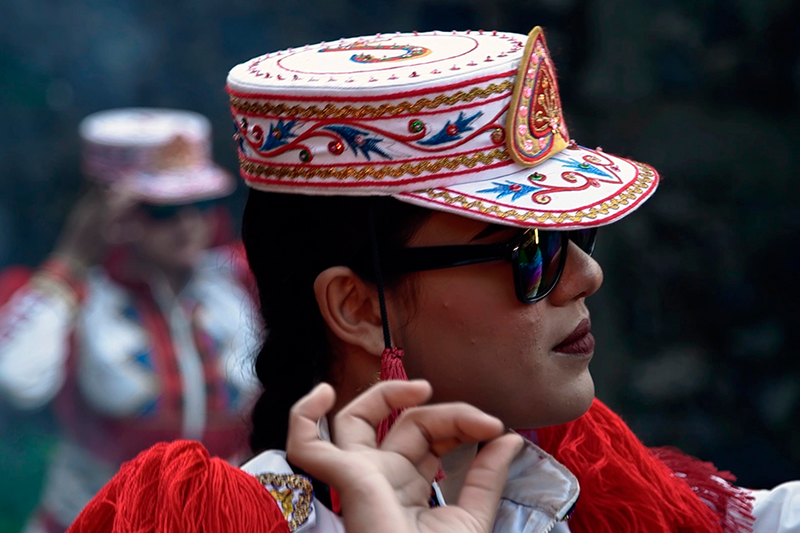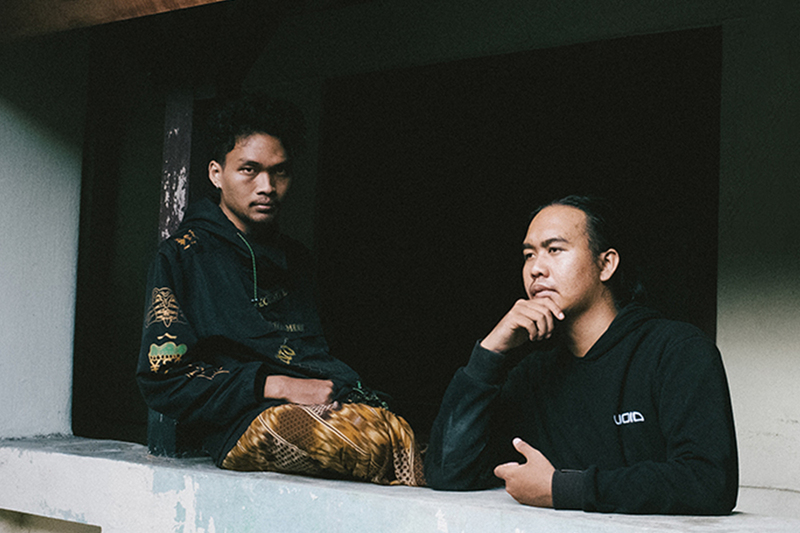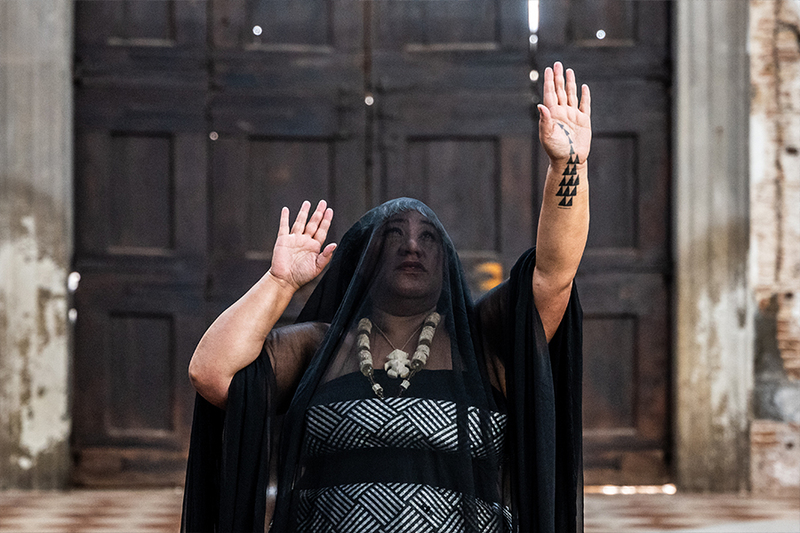
Artist Mariat Abdulkhamidova shares the story of an album of home recordings of her grandmother—a gesture of preserving not only Umuksum’s singing, from folk songs to religious chants and improvised verses, but also their shared time.
I recorded this album with my grandmother Umukusum (throughout the text I’ll use the word Ebel, which means “mother” in Avar) in early August, during my trip home. I call home our little version of Dagestan—my parents’ apartment in Moscow. At the start of summer, Ebel wasn’t feeling well, so she came to stay with my parents.
Every day she would dream of returning to her house in Botlikh, with the biggest garden, to once again feel free. The city felt cramped to her—no air—and I’m sure she’ll go back to Dagestan as soon as she regains her strength.
I’d known for a long time that she sang, but my attempts to persuade her to sing always failed—she would only do it on her own time. My grandmother has a strict character. As a child I was afraid of her, but quickly forgot about it and returned to loving her again. I remember there was always a long, sturdy stick lying around—just in case—but she never used it on me.
When Ebel got sick, the house became noisy, tense—as if everyone was bracing for something. I was too. But I was also preparing for our recording. At that moment, I made an important decision: to forget everything I knew or had heard about her, to free her from any outside opinion, and to give her all the space she needed.
At the same time, I wrote a short Avar fairytale—about a girl named Umukusum who watered an apricot pit with her tears until it grew into a tree. Honestly, I made it up just to record my grandmother’s voice. I remember coming home from a walk and Ebel whispered to me that we had to record everything urgently, while no one else was home. I think my parents had made my intentions more clear to her. We recorded the story, and then a whole album of songs. We laughed a lot while recording. Sometimes I cried, but tried to calm down quickly, so she wouldn’t get distracted or upset.
In Dagestan, I played the recordings for relatives and friends. Some recognized the songs, though they remembered different words. One of them—a song about a windy night—can also be found in a version by Ruslan Magomedov. But in his version, the male character calls the girl to come to him. A good version—a real Dagestani pop hit.
The album includes two songs Ebel remembered from her youth, a mawlid (devotional chant), a dhikr (Sufi litany), and three improvisations. In the final recording, she begins singing about her parents, who passed away too early—but quickly stops and says there’s no need to continue, that both she and I will only get upset. I didn’t ask anything further. I stopped the recording.
My mother Saidat Shapieva helped me translate this songs.
I am like sugar, eaten in broken pieces,
Drying out like the crust of bread.
I am like melting fat-tail,
Cut apart, piece by piece
Marry for love—
There is nothing sweeter than joined hearts.
Those who marry the ones they love
Think they earned it,
And life feels like paradise.
Seek the one
Your heart chooses.
Each day, tears fall from those
Who married without feeling.
Those lucky in love
Walk with pride,
As if they were never blessed,
But achieved it on their own.
Even those who got their beloved
Carry themselves like they live in heaven.
Even if you circle the whole world,
My words will not change.
Even if you turn into a seashore,
I will not betray my promise.
I am like sugar, eaten in broken pieces,
Drying out like the crust of bread.
I am like melting fat-tail,
Cut apart, piece by piece
My entire clan refuses to give me to you,
But if you are mine—hold your ground.
My brothers won't allow me to marry you.
Steal me away, if you must, to be together.
If the whole human race were to wash away
From the earth like water,
I still wouldn’t marry a man already wed.
To speak from the heart:
I’d rather die than give you up.
When I climbed the high mountain,
I didn’t look at the grass,
Only at the beautiful flowers.
When I descended the deep valley,
I drank not from the lake,
But only from the pure spring.
Even if you and the world turn away,
I will remain true to my word.
Even if you shift like the ocean shore,
I won’t retreat from my vow.
Don’t come to our house on a snowy night—
Mother will scold me if she finds your footprints.
But I will come to you on a snowy night,
So she’ll see them and scold you instead.
Don’t come on a windy night—
Mother will scold me if she hears the door creak.
But I will come to you on a windy night,
So she’ll hear and scold you instead.
Mountain river, rush to the sea,
Deliver my greeting to the fish that swim there.
If this world belonged to me,
I’d tear it in half
And give it to the one
Who cannot keep even a single promise.
There’s a spring at home, yet I die of thirst.
There’s shade on the porch, but I die of heat.
Mother says she’ll give me to the one they promised.
But if I’m given to him—
What shall I do with the one I love?
O Allah, forgive their sins,
As many as the stars in the sky.
And ours too, dear sisters,
As many as the stars in the sky.
Ya Allah, Ya Allah—
If I do not beg forgiveness,
Why this strong heart of mine?
Ya Habib, Ya Habib—
If every part of me does not tremble.
O Allah, forgive them,
And us as well, dear sisters,
As many as the stars in the sky.
Ya Allah, Ya Allah—
If I do not beg forgiveness,
Why this strong heart of mine?
Ya Habib, Ya Habib—
If every part of me does not tremble.
La ilaha illallah, faith, O Allah—
To die with faith in the heart.
La ilaha illallah, faith, O Allah—
To die with faith in the heart.
O Allah, forgive them,
And us as well, dear sisters,
As many as the stars in the sky.
La ilaha illallah, faith, O Allah—
To die with faith in the heart.
La ilaha illallah, faith, O Allah—
To die with faith in the heart.
La ilaha illallah, Alhamdulillah.
La ilaha illallah, Alhamdulillah.
La ilaha illallah, Alhamdulillah.
La ilaha illallah, Alhamdulillah.
Why say “Alhamdulillah,”
If my heart does not come to rest?
La ilaha illallah, faith, O Allah—
Let me die with faith in my heart.
This dhikr is left untranslated. It is traditionally recited during collective prayer and spiritual gatherings.
I have a good mother—
May her soul dwell in paradise.
She loved once, and so she knows
The weight of my love.
I have a bad father—
May he burn in hell.
He never loved,
And knows nothing of the cost of love.
Kazbek mountain rises high,
Stretching toward the sky.
Wink with just one eye,
So I’ll know you love me.
If the unloved were never chosen,
If love was always returned—
But fate is otherwise.
The unloved are given,
The loving go unloved.
A perfect son for his mother,
A bad husband for his wife.
Who will choose you, village flirt?
I’ll sell the flirt and buy a falcon,
Hold him close—kick you away.
Is there a girl more powerless than I?
Even the highest peak was beyond me.
Is there another like me,
Who could not quench her thirst
At the mountain stream?
I am a fool,
I am a fool.
I carried a sack of grain
To the mill—with no water.
Oh, I am the fool,
I am the fool.
Carried grain to the mill—
And brought no water.
Who hungers for mother’s bread,
Cry with me.
Who longs for father’s warmth,
Cry with me.
Mother left too soon . . .
